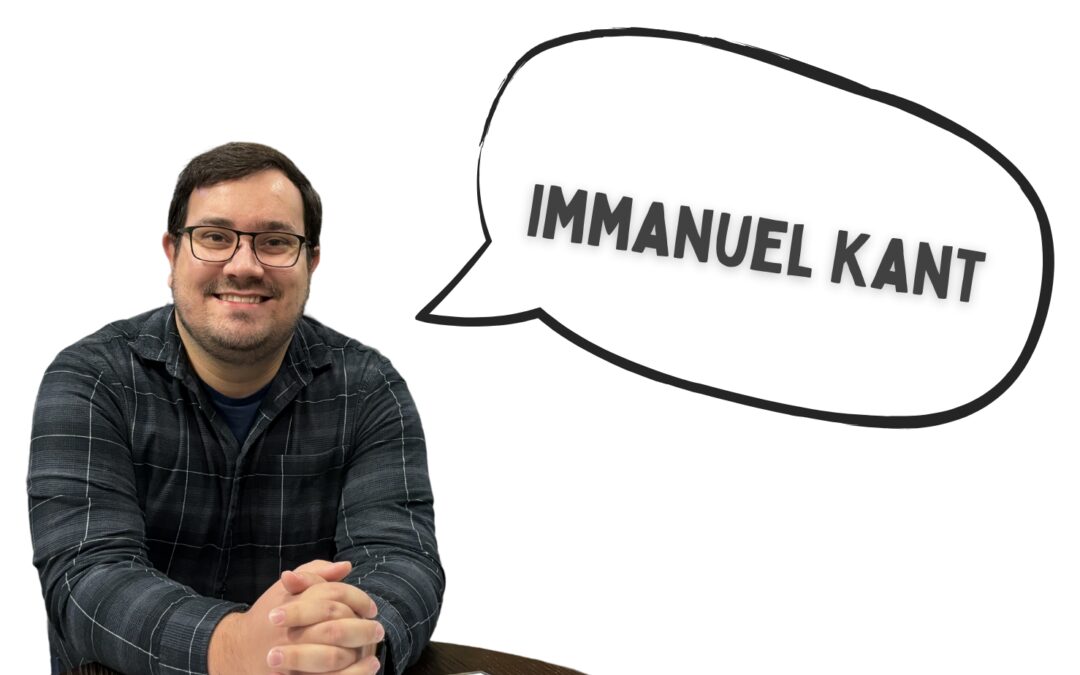Hello & Welcome! Today we’re discussing the philosophy of Immanuel Kant. I’ve been excited to write this blog regarding Kant; as he’s one of the HUGE names in philosophy and a hallmark of what is dubbed “Enlightenment Philosophy.” Which I may do a brief aside, to explain a little down the road but for right now, we’re just gonna focus on Immanuel Kant. If your new to the blog, here’s how it’s gonna go… First we will briefly look into Kant’s life, some notable figures that inspired him or were inspired by him, some key characteristics of his philosophy, some misconceptions regarding him, and then we’ll wrap up… but enough with the explanations, let’s get philosophical!
History:
So when it comes to the life of Immanuel Kant the word that immediately springs to mind is “content”; while I would describe Socrates as ferocious and Kierkegaard as depressed I would describe Kant as content.
Kant was Born on April 22, 1724 in Prussia, which is now a part of Germany, to Johann Georg Kant and Anna Regina Reuter. Kant originally spelt his name with a E, but soon switched it a little later in his life, once he started studying Hebrew. Kant as a boy was raised in a very religious house which influenced him and his philosophy in a lot of ways, which we’ll discus later.
Kant as a teenager showed himself to be very disciplined, which stems mostly from his strict upbringing, which made him an excellent studier. Graduating one of the major schools of his day at 16, before going onto University, at the University of Königsberg. Where he would spend the rest of his academic career, achieving a bachelors, masters, and eventually a doctorate in philosophy. Kant also studied mathematics, physics, logics, metaphysics, natural law and (most importantly) ethics.
Early is his life Kant had a very scientific bend, such as a theory on the earth’s rotation, and a theory on the milky way’s shape, a theory on the nature of nebulas, and a whole host of other things. It’s no exaggeration to say Kant was gifted in many ways. Even getting a license to lecture at his home university in 1745. Unfortunately though, Kant’s father passed away in 1746, which interrupted his studies, and possibly began his philosophical ideals, and after all the arrangements were done he released his first philosophical work “Thoughts of the True Estimation of Living Forces”.
It’s at this point that Kant’s philosophical career really starts… he publishes a host of great works whose names are way too long to type out. But after a string of successful publications Kant was officially made the Full Professor of Logic and Metaphysics at his university in 1770. It was here that Kant gave his inaugural speech called “On the Form and Principles of the Sensible and the Intelligible World” (this guy and his names) here is where Kant would begin most of the themes that he would be known for and develop later in his life.
The Inaugural address made Kant a well known philosopher very quickly. Which is rare for most philosophers and especially somewhat modern philosophers. While his popularity did falter at times with different works, for the most part, Kant remained popular throughout his lifetime.
However, Kant did get himself in trouble with the King of Prussia when he attempted to publish a controversial work known as “Religion within the Bounds of Pure Reason”. He originally tried to publish it in a public journal but with the French Revolution taking place at the same time the king of Prussia was SUPER paranoid about any kind of non-orthodoxical view of religion, which unfortunately put Kant in a bad spot. However, he did go around it, and tried to publish the whole work as a book, earning him a famous reprimand with the king. In 1794, Kant published a second edition, and was followed by a royal command to never speak about religion again, to which Kant replied and explained himself in the preface of “the conflict of the faculties”.
Unfortunately however, Kant’s health had been bad throughout his life and it finally caught up with him; he passed away on 12 February 1804. Kant’s last words were “It is good” his final work was later published by some friends of his under the name of “Opus Postumium”.
So that’s it for Kant’s life, let’s see who he influenced and who influenced him…
Notable Figures:
Johann Heinrich Lambert:
Johann Lambert was a major influence on Kant, who Kant himself mentioned multiple times especially in his works on Reason. Lambert’s main point was to distinguish between a subjective versus an objective thought. Since Lambert was a map maker he knew that drawing something on a map and seeing it in person is oftentimes very different. He didn’t see facts and logic as any different! That just because you perceive something doesn’t necessarily mean it’s true. This possible influenced Kant’s Categorical Imperative. Which we’ll discuss in a bit, but for now let’s move on to Hume.
David Hume:
Another major Enlightenment philosopher, who will definitely be getting his own blog post here on the Pocket Theologian blog, but David Hume is unique in that he and Kant share some special ethical points. For one, both Kant and Hume believed that morality was not based on religion, and that a person can be free and still not change the outcome of their actions and choices.
Kant’s Influence:
Arthur Schopenhauer:
One of the father’s of Nihilism, Schopenhauer liked how Asethic Kant’s ethics were, however he believed that Kant got lost in the large philosophical ideals and neglected the common day to day principles that people need. Which is accurate to an extent, however Schopenhauer wasn’t able to provide that answer himself, so there you go.
GWF Hegel:
That’s right! Many of you will remember him from our last philosophy post, but Hegel actually was influenced by Kantian ethics. But did have some bones of contention with them as well. Actually, he and Schopenhauer took the same issue with it; in that they both thought he didn’t provide any concrete advice or knowledge for how to live a moral life. He provided a way for you to determine if something is moral, but not how to use it or why.
Key Characteristics:
The absolute power of reason:
Kant is really responsible for kicking off what is called the “Enlightenment”, which basically was a period in history where common people, urged on by various philosophers began to doubt the beliefs and superstitions of the past and bring everything firmly into the light of reason. Basically, the whole idea of “if I can see it and if I can touch it then it’s real” is the enlightenment summed up. Now since Kant began this train, but as we’ll discuss in the misconceptions section, he may not have been the most thrilled at where it ended up. Essentially, Kant is one of the main Empiricist, which means that he believed that reason, or using your five senses through experimentation and experience, enables you to prove what is real and what is not. Now Kant did believe that there was a limit to it, kinda like Kierkegaard’s leap of faith.
Categorical Imperative:
This is probably the one thing that Kant is best known for, and it is stated in his 1785 book “Groundwork of the Metaphysic of Morals” thusly “Act only according to that maxim by which you can at the same time will that it should become a universal law.” So to break this down in a much simpler manner… what Kant is saying here is that “it can only be right for you, if it can be right for everybody.” Allow me to illustrate this! Imagine, if you will, that a man is hungry, he has no money for food, so he steals something. Under the categorical imperative then, everyman who is hungry can steal, this is then dubbed as morally right.
The absolute goodness of man:
Another key characteristic of Kant is his idea that morality is NOT determined by God. Kant instead believes that God IS moral, but morality exists separately of God, if that makes sense. Morality to Kant stems from what is called the “Good Will” which is defined as the only virtue which cannot be used for evil wims. This combined with what he calls duty, which basically should be determined by the action itself’s morality, not the consequence or the end result but the action itself. Also, Kant believed that regardless of religion he believed that man could make moral righteous choices because of this duty, motivated by good will.
Misconceptions:
That Kant hated Christianity or Religion:
This is not true. Kant, much like other philosophers who came after him, agreed that Religion performed an important social purpose, but not a moral one; which is a very important distinction. Kant thought that without religion people wouldn’t be able to go through hardships in life or avoid corruption, as he noted they had a tendency to do. But it’s important to note that Kant saw religion as more of a social club rather than as an institution for change.
That the categorical imperative is attempting to generalize actions:
The categorical imperative isn’t meant to be like “if everyone’s doing it, then it’s okay”, it’s to make you think the whole thing through and see if it has any logical inconsistency. The categorical imperative’s purpose is to make you reconsider your actions and see if they cause problems, rather than make a person comply with the general will of a group.
That the categorical imperative is the same as the “golden rule”:
So this a pretty common misconception, so as we explained earlier the categorical imperative’s purpose is to make you think that if everyone did it, would it be right? While the golden rule says to do unto others as you would have them to do you. Now these thoughts are similar but not quite the same.
That’s all I have for you today.. thanks for reading! Go in peace!


Recent Comments